Dy Dr. Wael Kanaan DDS MSD

What is a Night Guard?
Do you notice your teeth getting shorter?
Or do you often wake up with a sore jaw or headache?
These could be signs that you are grinding your teeth at night. Teeth grinding, also known as bruxism, is a common problem that affects many people. Fortunately, wearing the correct night guard can help protect your teeth from the damage caused by grinding while you sleep. However, not all night guards are created equal. In this article, Dr. Kanaan will discuss the different types of night guards available and their pros and cons. We will also cover the key factors to consider when selecting a night guard and how it can protect your teeth from damage and chronic headaches. If you're looking for the right night guard to protect your teeth, this post is for you!
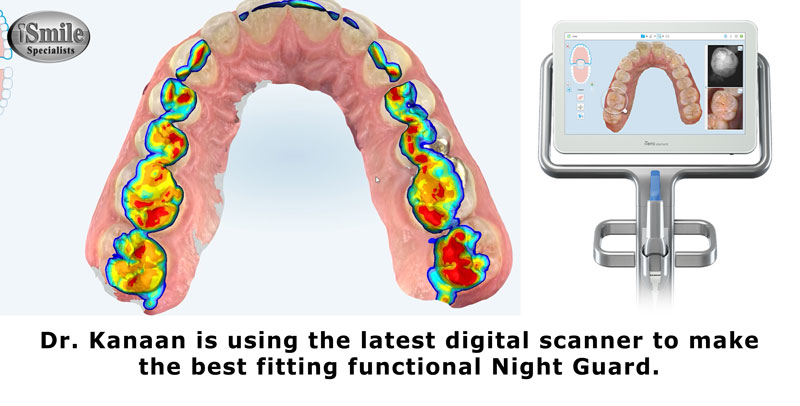
Understanding the Role of a Night Guard
Normally, teeth are supposed to be in contact no more than 20 minutes a day (REF) which happens mostly during chewing and swallowing. However, if a person starts to clench his teeth, this extra force will result in excessive wear of the his teeth and a possible damage to the surrounding structures.
Night guards play a crucial role in protecting your teeth from the harmful effects of grinding and clenching. By wearing a night guard, it will act as a cushion to absorb the harmful forces, alleviate jaw pain and prevent tooth damage.
Dr. Kanaan, I never grind my teeth!
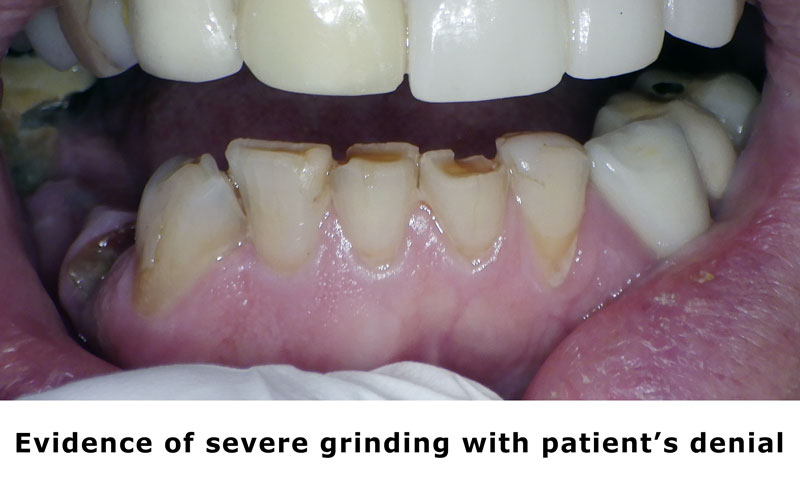
This is -mostly- the first response that I hear from my patients when telling them they grind their teeth. Grinding or Bruxism while sleeping will happen mostly during light sleep and your brain will not record or remember that you were grinding while sleeping. I can tell you that you are grinding by observing the symptoms of grinding on your teeth such as broken edges, flat surfaces, sore muscles, ...etc. (REF)
What are the Different Types of Night Guards ?
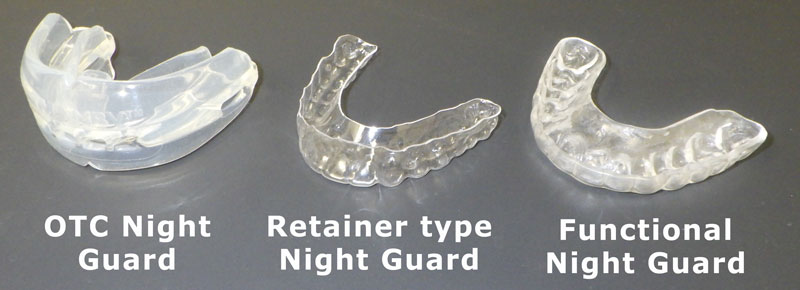
Night guards come in different types to suit your needs.
Over-the-counter Night Guards. These Night Guards are sold in Pharmacies, providing an affordable choice. However, they are non-custom made for the individual patient and most of the time do not have any functional protection of the teeth. They are not as durable and If not worn correctly, they can cause more harm that benefit. Additionally, some people find OTC night guards uncomfortable to wear.
Non-functional Night Guards. These are made by the dentist to fit your teeth. They are similar to the retainers and are made of a thin plastic material. They are made based of your teeth, not bite. They last from 6-12 months and they are not adjustable. You can consider these ones as an entry level night guards.
Functional Night Guards. These are professional night guards made from a thick acrylic material based on your teeth and bite. They provide optimal protection and offer a better, more precise fit compared to generic options. They are the most durable type and can last from 5 to 10 years with proper maintenance and provide the most durable protection. These night guards are the ONLY ones known to alleviate jaw pain more effectively and can help in preventing severe headaches caused by conditions like TMJ dysfunction.
Do I need a Night Guard?
While a night guard might be indicated for different reason, the three major indications to get a night guard immediately are:
- Severe damage of your teeth as a result of grinding
- Morning headache with tense muscles (REF)
- Limited jaw opening not related to trauma even with disk displacement. (REF)
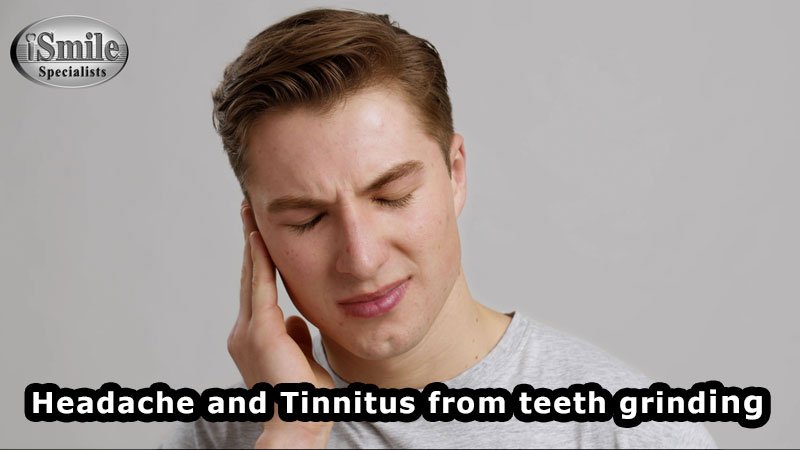
The Connection between Night Guards and headaches
Excessive force on your teeth has a detrimental consequence on all your masticatory system. The night guard will help preventing dental issues such as fractures and protect fillings, crowns, and dental implants. By reducing grinding pressure, night guards can also alleviate headaches caused by teeth grinding and promote healthier gums. Incorporating a night guard made from a firm material into your dental health routine can have a positive impact on your overall oral well-being.
What are the benefits of using a night guard?
The benefits of using a night guard include protecting your teeth from grinding or clenching, reducing jaw pain and headaches, preventing tooth damage, and promoting better sleep. Night guards can also help alleviate symptoms of TMJ disorders and improve overall oral health.
Why is Getting the Right Night Guard Essential?
Getting the correct night guard is crucial for the health of the teeth and muscles. Incorrect night guards - like over the counter ones- can exacerbate jaw tension and discomfort by distributing the force unevenly. On the other hand, a proper made night guard will distribute the force evenly preventing future dental damage. Custom-made night guards offer a more comfortable fit compared to over-the-counter options, which may not provide adequate protection.
Bad-fitting night guards can have serious consequences, such as an open bite. Dr. Kanaan have documented many cases of bite changes such as a lateral open bite as a result of wear an OTC night guard. Please check the two pictures below and notice how this patient developed an open bite due to the usage of an OTC night guard that was not properly fitting her teeth.
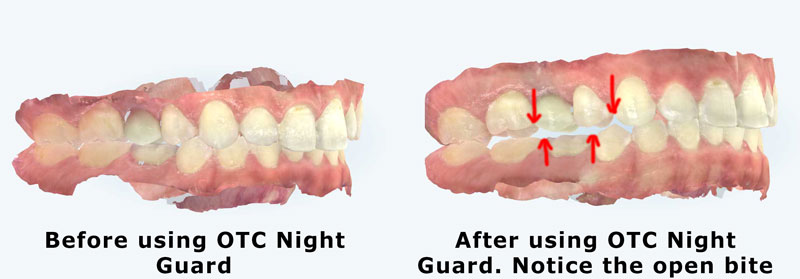
Assessing Comfort and Fit
It is very simple!
If your night guard is not comfortable, you will not wear it. Getting the right night guard is essential to ensure comfort and fit. A properly fitting night guard based on your bite and teeth should not cause discomfort or sore gums. It should fit snugly on your upper teeth with smooth biting surfaces. While over-the-counter guards may be readily available, a custom night guard offers a more comfortable fit. Comfortable night guards allow for a full night of sleep, preventing future damage caused by night grinding.
How much does a night guard cost?
The cost of a night guard can vary depending on various factors such as the type of night guard, the materials used, and the location where it is purchased.
- OTC night guard can cost between $20 to $120,
- A retainer type night guard will cost $200-$250, and
- The functional night guard will cost between $700 and $1500. Insurance usually will cover portion of the cost and your out of pocket might be as low as $250.
Evaluating your Teeth Condition
When selecting a night guard, it's important to consider your dental care needs, such as fillings, restorative dentistry, crowns, cosmetic dentistry or dental implants. Assessing any teeth misalignment issues is also crucial before making a choice. Evaluating your teeth condition will help determine the type of night guard that is required for optimal protection. Additionally, taking your enamel health into account is essential to ensure the right design for your mouth. Consulting with a dentist can provide an accurate evaluation of your teeth condition and guide you towards the most suitable night guard option.
How Does a Night Guard Protect your Teeth?
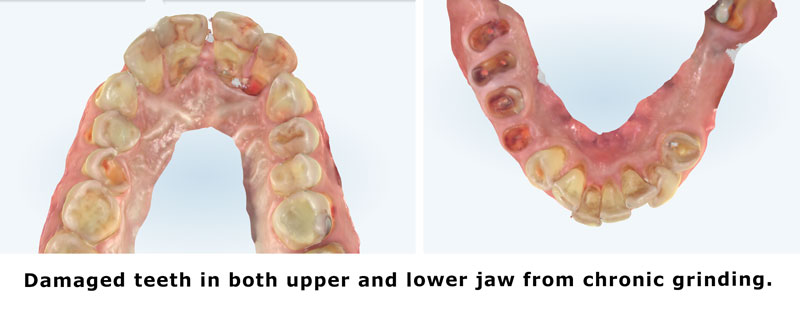
Night guards play a crucial role in protecting your teeth by acting as a cushion or stress breaker between your upper and lower teeth.
They act as a barrier, preventing the damage to your teeth from grinding and clenching. They might not stop you completely from griding, but will stop the damage from grinding.
By alleviating jaw tension, they reduce the risk of TMJ temporomandibular joint disorder.
Wearing a night guard also prevents tooth damage, enamel erosion, and other dental issues.
Custom-made night guards offer the most durable protection for your teeth, and proper care ensures their longevity and effectiveness.
How often you need to wear the night guard?
Your specialist will tell you how many hours you need to wear the night guard based on your case. Most patients need to wear the night guard at night only.
However, in extreme cases, your doctor might ask you to wear the night guard 24/7 except when eating. This is important in cases where we need to relax your jaw muscles or you have an advanced TMD (temporomandibular joint disorder)
How to clean the night guard?
It is important to clean your night guard regularly to prevent bacteria buildup and keep it in good condition, otherwise, it will stink.
Following these steps will help ensure that your night guard remains clean and hygienic for use. To clean your night guard, follow these steps:
- Brush: Never place the night guard in your mouth without brushing your teeth. Your teeth have to be clean.
- Rinse & brush: After removing your night guard from your mouth, rinse it and brush under warm water to remove saliva and any loose debris.: Pat dry the night guard
- Dry: put the night guard facing down in the case and leave it open. Make sure you leave the case open so bacteria and Mold will not grow on.
Make sure the night guard is dry after brushing
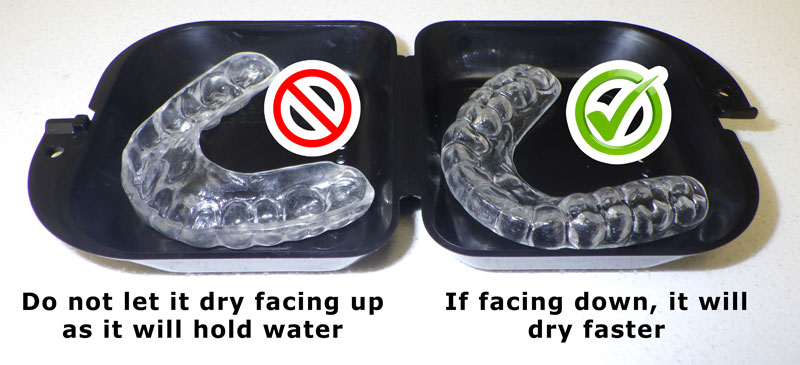
Conclusion
In conclusion, getting the right night guard is essential for protecting your teeth and preventing dental issues. Night guards play a crucial role in alleviating teeth grinding and clenching, which can lead to tooth damage and chronic headaches. It is important to understand the connection between night guards and dental health, as well as the impact of using incorrect night guards.
While over-the-counter night guards may be convenient, custom-made night guards offer additional benefits in terms of comfort and effectiveness.
